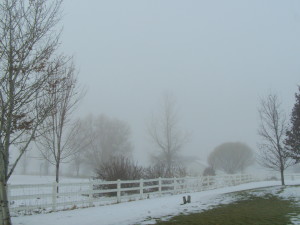In the summer, when the sun is shining and the weather is warm, we get dirty. We do yard work. We play outside, and we sweat. We tromp through the forest and we swim in ponds, in lakes, in oceans, and in pools with others. We go to parks, we go to barbeques, we ride amusement rides, and we socialize in a variety of settings- most below average by our standards of “cleanly”…yet, as a general population exceeding millions, we don’t get the influenza virus during summer, despite all the mediums a virus could thrive in. In winter, we stay clean. With the exception of an atypical hour or two outside, we stay inside. We go from place to place, all of which value sanitization at a level much higher than the outdoors. Yet, despite this, millions more come down with the flu during winter, catching a common yet potentially fatal virus that seems to only surface during cold months. But before the basics of a cure for the flu can even be pondered, scientists must answer one question- the same we’ll explore in this blog: why is the flu only prevalent in winter months and cold weather?
Unfortunately, similar to a variety of other scientific questions, there is no widely known or widely accepted answer to this. Scientists -like Andrew Read- have been unable to positively identify the cause of the flu and why it thrives only in the cold. Centuries of research have gone by without a solidified answer. However, despite a blanket of mystery as thick as…a blanket of snow… a few theories have risen to become the most widely accepted, concerning why the flu snowballs and thrives in cold weather.
The first theory is concurrently the most simple. Winter (and the cold weather it entails) causes more people to stay indoors. There is obviously less room indoors than outdoors. What this leaves us with is the degradation of space and the accumulation of people. Logically, one could assume that this is what enables the flu to spread- more bodies in a more confined environment during winter. But sadly, this first theory is concurrently the most unapproved, also. If this were the case, after all, why wouldn’t people in populated cities come down with the flu in warm weather, crammed on trains, buses, streets, planes, and subways?
The second theory is also the second most accepted. In winter, we are exposed to the sun less often. In winter, our bodies therefore generate less Vitamin D and less melatonin, as well as less of other important aspects to our immune system. In winter, ultimately, our immune system is weaker, making us more susceptible to the influenza virus.
The third theory is the most accepted and proven, in addition to being the most complicated. Put simply, the virus thrives in cold weather. Its very name is derived from the French “Influenca di Freggo” which literally means “Influence of Cold”. Even guinea pigs (the sole animal to contract the flu like humans) only receive and transmit the flu in temperatures colder than fifty degrees- clearly signifying the disease prospers in frigid air. Why? When we breathe, we breathe out the virus in moist particles. The air is drier in winter. The drier the air, the more moistness there is that evaporates from the particles. And the more moistness that evaporates away from the virus…the lighter the virus gets. And the lighter the virus is, the more capable it is of floating through the air, making it monumentally more infectious. With the weaker immune systems mentioned in the second theory, a “sick” combination arises alongside a more infectious disease.
However, the theories don’t end and the studies haven’t either. Those theories mentioned above are but the most notable amidst many others, such as changing air currents or the behavioral and biological patterns of children. Since they’ve began operating through mass media, infectious experts and doctors and scientists all over tell us repeatedly we should stay calm during an outbreak of disease. Panic only makes things worse. Panic leads to more breakdown than necessary. However…infectious experts have offered alternative advice in response to the developing studies: regarding the flu, the last thing we should do is chill out.




First of all- the puns. You managed to make me highly amused while reading about two things I hate- the cold and the flu. I really like how you included multiple theories as well as both the support for and problems with each. I have always heard the second theory, that our immune systems are weaker during the winter, but I never really heard or considered that it was due to lack of Vitamin D but rather that immune systems slow down in the cold. That is, however, a good point. Additionally, the fact about Guinea Pigs being the only other animals to contract the flu like humans was very interesting and it made me really wonder why. This post was filled with interesting theories and concepts, and it’s lack of a concluding reason was very characteristic of science in general.